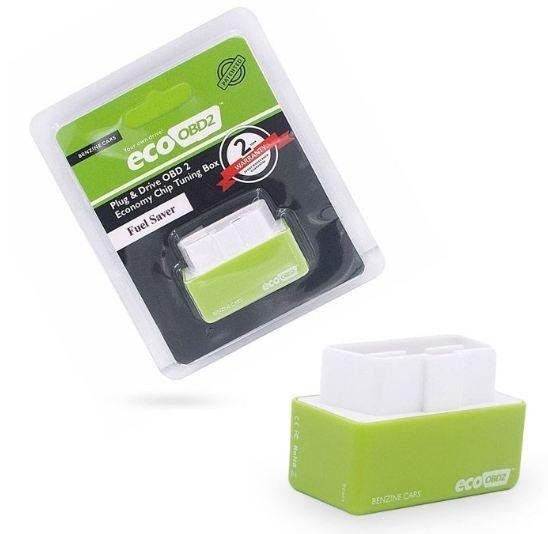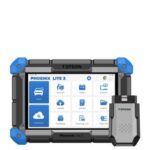With rising gas prices and a growing awareness of environmental concerns, the quest for better fuel efficiency is constantly on the minds of car owners. In this landscape, devices like the Eco OBD2 chip have emerged, promising to boost your vehicle’s mileage and reduce fuel consumption. But do these gadgets truly live up to the hype, or are they just another automotive myth? As car repair experts at carparteu.com, we delve into the reality behind Eco OBD2 devices and answer the crucial question: does Eco OBD2 really work?
The promise of simply plugging in a small device and instantly saving money at the pump is undeniably appealing. The market is flooded with various “fuel saving chips” that claim to optimize your engine’s performance and dramatically improve gas mileage. One such product that has gained attention is the Effuel ECO OBD2 chip, which we’ll examine more closely in this article, drawing insights from initial reports and user experiences.
Understanding Eco OBD2 and Its Claims
To understand whether Eco OBD2 devices work, we first need to understand what they are and what they claim to do. OBD2 stands for On-Board Diagnostics II, a standard system in most cars manufactured after 1996. This system monitors various aspects of your vehicle’s performance, including engine emissions, fuel efficiency, and overall system health. The OBD2 port is essentially an access point to your car’s computer, the Engine Control Unit (ECU).
Eco OBD2 chips are plug-in devices that connect to this OBD2 port. Manufacturers of these devices often claim they can:
- Improve fuel efficiency: Reduce fuel consumption by a significant percentage, often cited as up to 15-30%.
- Increase engine power and torque: Enhance vehicle performance and responsiveness.
- Lower emissions: Contribute to a more environmentally friendly driving experience.
- Easy installation: Simple plug-and-play setup, requiring no mechanical expertise.
These are bold claims, and naturally, they raise skepticism. The core question is whether these small devices can actually deliver such significant improvements, or if they are just capitalizing on drivers’ desire for fuel savings.
Effuel ECO OBD2: A Closer Look at the Claims
The Effuel ECO OBD2 chip is one example of these fuel-saving devices. According to its promotional materials, it works by “remapping” or “optimizing” the ECU settings of your car. The idea is that by tweaking these settings, the engine can run more efficiently, leading to less fuel consumption without compromising performance.
Effuel and similar products suggest that they analyze your driving habits for a short period after installation (around 150 miles of driving) and then adjust the ECU to optimize fuel usage based on this data. They emphasize that this optimization is done without making permanent changes to the car’s original programming and can be easily reversed by simply unplugging the device.
The appeal of Effuel, as highlighted in initial reviews, lies in its promise of being a cost-effective solution compared to buying a new, fuel-efficient car. It’s marketed as a one-time purchase with no ongoing costs, offering a simple way to save money on fuel and contribute to a greener environment.
Does Eco OBD2 Technology Actually Work? – The Reality Check
While the concept of optimizing ECU settings for better fuel efficiency isn’t entirely unfounded, the effectiveness of plug-in Eco OBD2 chips like Effuel is highly debatable and lacks substantial scientific backing. Modern car ECUs are already sophisticated systems designed by automotive engineers to optimize engine performance and fuel efficiency for a wide range of driving conditions.
Here’s a more realistic perspective:
- Limited Scope of Optimization: Car manufacturers invest heavily in research and development to fine-tune engine control systems for optimal performance and fuel economy. It’s unlikely that a generic plug-in chip can significantly outperform these sophisticated, factory-engineered settings.
- Generic vs. Specific Tuning: Eco OBD2 chips are often marketed as universal devices for a wide range of vehicles. However, engine characteristics and ECU programming vary greatly between car makes and models. A generic “tune” is unlikely to be as effective as a custom tune specifically designed for a particular vehicle.
- Fuel Efficiency is Multifaceted: Fuel consumption is influenced by numerous factors beyond ECU settings, including driving habits (aggressive acceleration, speeding), vehicle maintenance (tire pressure, engine condition), and external conditions (weather, terrain). An OBD2 chip alone cannot overcome the impact of these factors.
- Lack of Independent Verification: Claims made by manufacturers of Eco OBD2 chips are often not supported by independent, third-party testing. Reviews and testimonials should be viewed with caution as they may be biased or anecdotal.
The assertion that these devices can achieve dramatic fuel savings of 15-30% is often seen as exaggerated and unrealistic by automotive experts. While some users might report perceived improvements, these could be attributed to placebo effects or changes in driving habits coinciding with the device installation.
User Experiences and Reviews: What Are People Saying?
Looking beyond the marketing claims, user reviews for Eco OBD2 devices, including Effuel, present a mixed bag of experiences. While some users report satisfaction and perceived fuel savings, a significant number express skepticism or outright disappointment.
Common themes in user reviews include:
- No noticeable improvement: Many users report no measurable difference in fuel economy after installing an Eco OBD2 chip.
- Placebo effect: Some users who initially reported positive results later attributed them to psychological factors rather than actual device performance.
- Concerns about long-term effects: There are concerns about potential negative impacts on engine performance or warranty due to aftermarket modifications, although Effuel claims reversibility.
- “Scam” accusations: A portion of reviews label Eco OBD2 devices as scams, citing lack of tangible results and misleading marketing.
It’s important to note that online reviews can be subjective and influenced by various factors. However, the prevalence of negative or neutral reviews raises questions about the consistent effectiveness of these devices.
Factors Affecting Fuel Efficiency (Beyond Gadgets)
Before investing in an Eco OBD2 chip with hopes of significant fuel savings, it’s crucial to consider the factors that genuinely impact your car’s fuel efficiency:
- Driving Habits: Smooth acceleration, consistent speeds, and avoiding hard braking are key to fuel-efficient driving. Aggressive driving habits dramatically increase fuel consumption.
- Vehicle Maintenance: Regular maintenance, including oil changes, air filter replacements, and properly inflated tires, ensures optimal engine performance and fuel economy.
- Tire Pressure: Underinflated tires increase rolling resistance, leading to higher fuel consumption. Check and maintain proper tire pressure regularly.
- Vehicle Weight: Excess weight in your vehicle reduces fuel efficiency. Remove unnecessary items from your trunk and cabin.
- Aerodynamics: Roof racks and cargo carriers can increase drag and fuel consumption, especially at highway speeds.
- Route Planning: Choosing routes with less stop-and-go traffic and avoiding congested areas can improve fuel economy.
- Engine Condition: A well-maintained engine runs more efficiently. Address any engine issues promptly.
Focusing on these proven methods is likely to yield more tangible and reliable fuel savings than relying solely on an aftermarket plug-in device.
How to Install and Use Eco OBD2 (Using Effuel as an Example)
Despite the skepticism surrounding their effectiveness, Eco OBD2 chips are generally easy to install. Using Effuel as an example, the installation process is straightforward:
- Turn off the ignition: Ensure your car engine is completely off and the key is removed.
- Locate the OBD2 port: This port is usually located under the dashboard on the driver’s side. Consult your car’s manual if you’re unsure of its location.
- Plug in the Eco OBD2 chip: Simply plug the Effuel device into the OBD2 port.
- Turn the ignition to “on” (but don’t start the engine): Insert the key and turn it to the “on” position, illuminating the dashboard lights, but do not start the engine.
- Press the “reset” button on the chip: Hold the reset button on the Effuel device for a few seconds.
- Start the engine: Start your car engine as usual.
- Drive: The device is supposedly now working and learning your driving habits.
The simplicity of installation is often highlighted as a selling point, but it’s important to remember that ease of use doesn’t guarantee effectiveness.
Are Eco OBD2 Chips Worth It? – Pros and Cons
Pros:
- Easy to install: Simple plug-and-play installation.
- Potentially reversible: Can be easily removed without permanent modifications.
- Low initial cost: Relatively inexpensive compared to other fuel-saving methods.
Cons:
- Questionable effectiveness: Limited evidence of significant and consistent fuel savings.
- Unverified claims: Marketing claims often lack independent scientific backing.
- Potential for placebo effect: Perceived improvements may be psychological rather than actual.
- Unlikely to outperform factory ECU tuning: Modern ECUs are already highly optimized.
- May not address root causes of fuel inefficiency: Doesn’t address driving habits or maintenance issues.
Conclusion: Eco OBD2 – Hype or Help?
So, does Eco OBD2 really work? The honest answer, based on current evidence and expert opinions, is unlikely to a significant or reliable degree. While the idea of a simple plug-in device optimizing your car’s fuel efficiency is appealing, the reality is that modern vehicles already have sophisticated engine management systems.
Eco OBD2 chips like Effuel may offer a marginal and often imperceptible improvement in fuel economy for some drivers in specific conditions. However, the dramatic fuel savings advertised are generally not substantiated, and user experiences are inconsistent. It’s more likely that any perceived benefits are due to placebo effects or coincidental changes in driving habits.
For drivers genuinely seeking to improve fuel efficiency, focusing on proven methods like adopting fuel-efficient driving habits, maintaining their vehicles properly, and ensuring correct tire pressure is a far more effective and reliable approach. While the allure of a quick and easy fix is understandable, when it comes to Eco OBD2 chips, it’s wise to approach the claims with healthy skepticism and realistic expectations.
Disclaimer: As car repair experts at carparteu.com, this review is based on our understanding of automotive technology and available information. Individual results with Eco OBD2 devices may vary. This article is for informational purposes only and should not be considered definitive proof of the effectiveness or ineffectiveness of Eco OBD2 chips. We recommend consulting with a qualified mechanic for personalized advice regarding your vehicle’s fuel efficiency.

